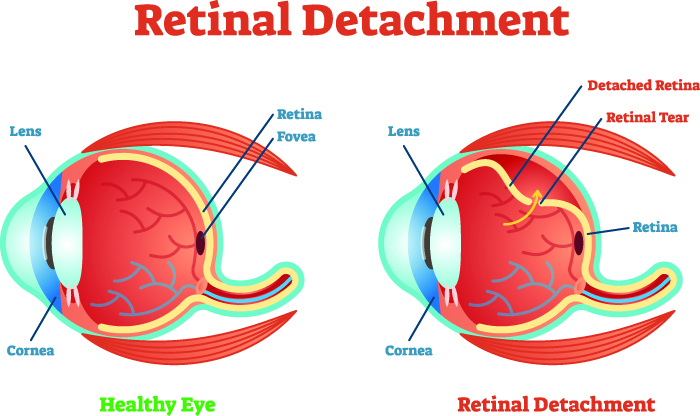Retinal Detachment Treatment in Alwarpet, Chennai
Retinal detachment is a significant eye problem. It is also known as detached retina. Retina is the layer of cells which lines up the inside of the eye. Retinal detachment occurs when the tissue which holds back the retina at its particular position pulls away.
To seek treatment, you can search for the ophthalmology hospital near me. You can also search for ophthalmology surgeon near me.

What are the symptoms of retinal detachment?
The symptoms vary from person to person. Few of the symptoms that one may experience are:
- Side vision darkening
- Shadow in vision leading to partial vision problem
- Flashes of light in vision
- Experiencing floaters, threads, flecks and dark spots in vision
In case you have any of the above symptoms, visit an ophthalmology hospital near you.
What causes retinal detachment?
There are three specific causes:
- Rhegmatogenous: This is the most common cause of retinal detachment. Due to a tear in the retina, the eye fluid (vitreous) collects behind the retina, leading to detachment of retina. It mostly happens as one grows older.
- Exudative: In this case, eye fluid collects behind the retina even without any tear in the retina and causes a fluid build-up. It happens either because of a leak in a blood vessel or swelling behind the eye.
- Tractional: A scar in the retina tissue can pull the retina away from the eye. Diabetes mellitus is one of the most common reasons for a scar in the retina. High blood sugar for a prolonged period of time can damage the blood vessels in the eye which may lead to retinal tissue scar.
When do you need to see a doctor for retinal detachment?
In case you have the symptoms as mentioned above, you should seek immediate consultation, diagnosis and treatment.
Request an appointment at Apollo Spectra Hospitals, Alwarpet, Chennai.
Call 1860 500 2244 to book an appointment.
Who is at risk of retinal detachment?
The risk for retinal detachment increases with age. The risk increases in case you have had:
- Any eye surgery
- Retinal detachment in family history
- Eye injury
- Retinal tear problem
- Retinal detachment in the other eye
- Eye problems like retina thinning
- Vision problem
How is retinal detachment diagnosed?
Your ophthalmologist will start the diagnosis with an eye test. Patients also undergo dilated eye exams to specifically check for retinal detachment. In dilated eye tests, eye drops are used, which widens the pupil. This helps the doctor to examine the eye very clearly and closely.
As per the results of the dilated eye test, your doctor may also suggest few other diagnosis tests like:
- Ocular ultrasound: In this case, eye drops are used to numb the eyes so as to avoid any discomfort during the whole procedure. Ultrasound instrument is used to scan the eyes. Scanning is also done for closed eyes, with a gel used over the eyelids. Doctors ask for eyeball movement while scanning thereafter.
- Optical coherence tomography (OCT): Once dilating eye drops are used, an OCT machine is used to scan the eyes without any physical touching.
How is retinal detachment treated?
Few of the treatment options for retinal detachment are:
- Pneumatic retinopexy: This technique is effective when the detachment of the retina is not substantial. In this case, the doctor uses a small bubble of gas to close the retinal tear. Furthermore, cryopexy or laser is used to seal the tear completely.
- Cryopexy and laser therapy: These techniques are effective only if the diagnosis is done at an initial stage. The doctor uses a freezing tool or laser to seal the retinal tear, causing the retina to stay in place.
- Vitrectomy: In this surgical treatment, the fluid of the eye (vitreous) is removed and an air bubble, oil or gas is used further to push and move the retina in its original place. If oil is used, it is removed after a specific duration by the doctor. In case an air bubble or gas is used, it is reabsorbed.
- Scleral buckle: In this treatment method, a silicon buckle is placed around the eye via surgery. This buckle or band holds the retina in place and stays there permanently.
Conclusion
Retinal detachment is an important eye issue. If not treated on time, it can lead to partial vision loss and even blindness. In case you have an eye related problem, search for ophthalmology doctors near me.
References
https://my.clevelandclinic.org/health/diseases/10705-retinal-detachment
https://www.mayoclinic.org/diseases-conditions/retinal-detachment/symptoms-causes/syc-20351344
Retinal detachment is quite a rare eye condition, especially with someone with no eye problem.
Retinal detachment is usually not painful. However, one may feel uneasy due to vision problems. One should always consult a doctor for treatment.
One should undergo regular eye tests and maintain eye care to prevent the condition of retinal detachment. Immediate treatment should be taken very seriously.
Symptoms
Our Doctors
DR. M SOUNDARAM
MBBS, MS, FCAEH...
| Experience | : | 8 Yeras Experience |
|---|---|---|
| Speciality | : | Ophthalmology... | Location | : | Alwarpet |
| Timings | : | Available by prior a... |
DR. UMA RAMESH
MBBS, DOMS, FRCS...
| Experience | : | 33 Yeras Experience |
|---|---|---|
| Speciality | : | Ophthalmology... | Location | : | Alwarpet |
| Timings | : | Sat : 12:00 PM to 1:... |
DR. MANOJ SUBHASH KHATRI
MBBS, DO, DNB, FICO(...
| Experience | : | 15 Yeras Experience |
|---|---|---|
| Speciality | : | Ophthalmology... | Location | : | Alwarpet |
| Timings | : | Available by prior a... |
DR. SRIPRIYA SANKAR
MBBS, Madras Medical...
| Experience | : | 30 Yeras Experience |
|---|---|---|
| Speciality | : | Ophthalmology... | Location | : | Alwarpet |
| Timings | : | Tue, Thur: 05:00 PM ... |
DR. PRATIK RANJAN SEN
MBBS, MS, DO...
| Experience | : | 23 Yeras Experience |
|---|---|---|
| Speciality | : | Ophthalmology... | Location | : | Alwarpet |
| Timings | : | ON CALL... |
DR. MEENAKSHI PANDE
MBBS, DO, FRCS...
| Experience | : | 27 Yeras Experience |
|---|---|---|
| Speciality | : | Ophthalmology... | Location | : | Alwarpet |
| Timings | : | Available on prior a... |
DR. ASHOK RANGARAJAN
MBBS, MS (OPHTHAL), ...
| Experience | : | 20 Yeras Experience |
|---|---|---|
| Speciality | : | Ophthalmology... | Location | : | Alwarpet |
| Timings | : | Mon, Wed, Fri : 6:00... |
DR. SAPNA K MARDI
MBBS, DNB (Opthal)...
| Experience | : | 30 Yeras Experience |
|---|---|---|
| Speciality | : | Ophthalmology... | Location | : | Alwarpet |
| Timings | : | Tue, Thur : 10:00 AM... |
DR. SRIKANTH RAMASUBRAMANIAN
MBBS, MS (Ophthal), ...
| Experience | : | 14 Yeras Experience |
|---|---|---|
| Speciality | : | Ophthalmology... | Location | : | Alwarpet |
| Timings | : | Mon, Wed, Fri | 10... |
Our Top Specialities
NOTICE BOARD
CONTACT US
CONTACT US
 Book Appointment
Book Appointment











.svg)
.svg)
.svg)
.svg)








